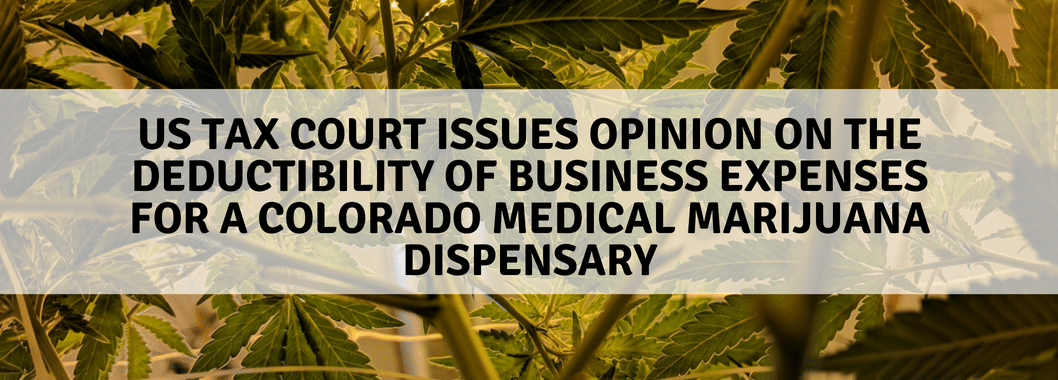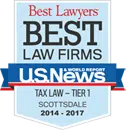Nevada Marijuana Businesses and Federal Income Tax Challenges Regarding Business Expense Deductions In 2001, the…
US Tax Court Issues Opinion on the Deductibility of Business Expenses for a Colorado Medical Marijuana Dispensary
Thirty states and the District of Columbia currently have laws broadly legalizing marijuana in some form. Most of these states have decriminalized the use of medical marijuana only.
Eight states and the District of Columbia have adopted laws legalizing marijuana for recreational use. These states include: Washington, Oregon, California, Nevada, Colorado, Alaska, Maine, and Massachusetts.

Not only have states experimented with the decriminalization of marijuana use and possession, they have created intrastate markets for the sale of marijuana in forms ranging from traditional bud to all manner of edibles. By most accounts, the market for recreational marijuana is booming in these states. For example, Nevada recreational marijuana sales exceeded $41 million in March 2018, and Nevada’s recreational marijuana market is less than one year old.
However, marijuana remains illegal under Federal law, and this creates an uncertain landscape for marijuana businesses in the preparation of their Federal income tax returns.
In very general terms, the Internal Revenue Code (IRC) allows individuals and businesses to deduct “ordinary and necessary” expenses incurred during the taxable year in carrying on a trade or business. See specifically IRC Section 162. Therefore, it is commonplace for businesses to deduct a wide variety of expenses such as advertising and marketing costs, salaries and wages, rent, and depreciation on equipment used in the business.
IRC Section 280E was once an obscure and overlooked provision in the Tax Code; now, it is a thorn in the side of businesses cultivating, producing, and selling marijuana.
Under Section 280E, businesses are prohibited from deducting business expenses or taking credits related to income from the sale of federally controlled substances, including marijuana. Section 280E was added to the tax code in 1982, following the United States Tax Court’s opinion in Edmondson v. Commissioner, T.C. Memo. 1981-623. 
Edmondson was in the business of selling amphetamines, cocaine, and marijuana. The IRS determined a deficiency in Edmondson’s income taxes after disallowing all of his claimed business expenses and costs of goods sold. Cleverly, Edmondson argued that he was entitled to deduct his ordinary and necessary business expenses, in order to reduce his tax burden, just like any other “legal” business would. The Tax Court’s opinion focused on whether Edmondson had substantiated his business expenses, and indeed, Edmondson did provide sufficient documentation to support some, but not all of his claimed business deductions. Ultimately, Edmondson was allowed to recover the cost of the controlled substances he sold, and also to claim business deductions such as the portion of the rent he paid on his apartment (his sole place of business), the cost of a small scale, packaging expenses, telephone expenses, and automobile expenses.
After the Edmondson Tax Court case, Congress created Internal Revenue Code Section 280E to prevent other drug dealers from asserting their right under Federal tax law to deduct ordinary and necessary business expenses. Section 280 E reverses the Edmondson holding as it relates to deductions other than the cost of the controlled substances. Section 280E reads:
No deduction or credit shall be allowed for any amount paid or incurred during the taxable year in carrying on any trade or business if such trade or business (or the activities which comprise such trade or business) consists of trafficking in controlled substances (within the meaning of schedule I and II of the Controlled Substances Act) which is prohibited by Federal law of the law of any State in which such trade or business is conducted.
Interpreted strictly, IRC Section 280E prohibits a marijuana business from deducting any business expenses – even salaries, wages, employee benefits, training, rent, travel, advertising, and depreciation. Why? Because marijuana remains a controlled substance under Federal law.
Attempts to fight this argument in Tax Court have not been successful. For example, the IRS audited Canna Care Inc., a California medical marijuana dispensary, and denied Canna’s deductions for operating expenses, including significant amounts for employee salaries and vehicle expenses. The company appealed the IRS’ findings to the United States Tax Court. Relying on section 280E, the Court upheld the IRS’ determination and denied all of Canna’s deductions. See Canna Care, Inc. v. Commissioner, T.C. Memo 2015-206.
In Californians Helping to Alleviate Medical Problems, Inc., v. Commissioner, 128 T.C. 173 (2007)(“CHAMP”), https://www.ustaxcourt.gov/inophistoric/champ.tc.wpd.pdf, the government acknowledged that Section 280E does not prohibit a taxpayer from claiming costs of goods sold (COGS). Footnote 4 of the opinion provides as follows: “respondent [the IRS] concedes that the disallowance of sec. 280E does not apply to costs of goods sold, a concession that is consistent with the caselaw on that subject and the legislative history underlying sec. 280E.”
Most recently, on June 13, 2018, the United States Tax Court issued its opinion in Alterman & Gibson v. Commissioner, T.C. Memo. 2018-83.
During the years before the Court, the taxpayers owned a medical marijuana dispensary in Colorado. The dispensary sold smokable marijuana in the form of “joints” and dried marijuana buds. It also sold a wide variety of edible marijuana products such as brownies, cakes, and oral tinctures. In addition, the dispensary sold marijuana paraphernalia such as pipes, papers, and other items used to consume marijuana. Eventually, the dispensary began to grow its own marijuana in a warehouse when Colorado required medical marijuana businesses to grow at least 70% of the marijuana they sold. The IRS audited taxpayers, who reported all of their income and expenses related to the marijuana dispensary on a Schedule C. The IRS’ notice of deficiency allowed taxpayers’ costs of goods sold, but disallowed all business expense deductions (under Section 280E) except depreciation and section 179 expenses.
The Tax Court upheld the IRS’ disallowance of all business expense deductions, even those related to that portion of the taxpayers’ business that sold non-marijuana products such as marijuana paraphernalia. Specifically, the Court stated:
Under the circumstances, we hold that selling non-marijuana merchandise was not separate from the business of selling marijuana merchandise. First, Altermeds, LLC, derived almost all of its revenue from marijuana merchandise. Second, the types of non-marijuana products that it sold (pipes and other marijuana paraphernalia) complemented its efforts to sell marijuana. Altermeds, LLC, had only one unitary business, selling marijuana. If, however, selling non-marijuana merchandise were considered a separate business, then the expenses of that business would be deductible. See CHAMP, 128 T.C. at 183-185 (stating that caregiving services were a business separate from provision of marijuana; expenses of providing caregiving services were deductible).
In sum, the Alterman Tax Court opinion reemphasizes the Tax Court’s past rulings related to marijuana businesses: (1) business expenses are not deductible under Section 280E; (2) costs of goods sold are allowable, as long as they are calculated correctly; and (3) business expenses may be deductible if a marijuana business also conducts a second, ancillary business that is completely separate from the sale of marijuana.
If you own a business selling, growing, or producing marijuana, you need to work with an experienced Nevada tax lawyer to understand your tax rights and responsibilities. The landscape is changing so quickly that you need a legal advocate on your side to help you navigate it all. If your business is audited and you don’t have detailed information about every single transaction, you risk forfeiting your COGS claim and you could be subject to penalties for filing an inaccurate tax return.
Silver Law PLC operates in Arizona and Nevada and all of its lawyers are former trial attorneys for the IRS. An Arizona tax law lawyer from our team can help you understand how the complex Tax Code applies to your marijuana business operations. We’ll help you ensure that you are meeting your obligations. If you have been audited or are facing collections, we are also in a position to help you navigate that process. We can either find ways to bring down your tax debt or can negotiate a settlement for you. Call us today to talk with a tax lawyer and learn more.

Email: lchapman@silverlawplc.com
Website: taxcontroversy.com
Arizona Location
7033 E. Greenway Pkwy, Ste 200
Scottsdale, AZ 85254
Office:(480) 429-3360
Henderson Location
410 South Rampart Blvd, Suite 390
Las Vegas, Nevada 89145
Office: (702) 801-1000
Las Vegas Location
410 South Rampart Blvd, Suite
390 Las Vegas, Nevada 89145
Office: (702) 726-6819
San Diego Location
7676 Hazard Center Drive, Suite
1525 San Diego, CA 92108
Office: (619) 387-3790
Coronado Location
724 1st St.
Coronado, CA 92118
Office: (619) 612-5337
Utah Location
11576 S. State Street, Suite 1002
Draper, Utah 84020
Office: (801) 340-7514
















Leave a Reply
You must be logged in to post a comment.